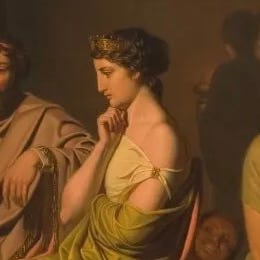Welcome to A Classical Woman
What am I supposed to be doing with my life? What is a Christian woman to do in this modern age? These were the unspoken questions of my early adulthood. I lacked vision for how a life of faith extended beyond my Bible study, and the result was years of my life characterized by listlessness. While I pursued a life of ministry in my local church, I nonetheless experienced a painful gap between the high of that work with the low of my day-to-day. Someday I will show my journals from those years to my children. My habitual pattern was to write stomach-sunk letters to God asking for his help to stop being the kind of woman who spent late nights binging television shows and beginning each new day worn out and discouraged by my sluggish existence yet again. I knew better. I loved God. But change was slow.
And then I became a mother. My care and connection to the created order was deepened through the intense pain and ecstatic joy of birthing an eternal human being into the world. Slowly but surely I began waking up to the glory, the weight, of the world I had to introduce my little girl to. But I still had so many questions about how. Somewhere along the way I recalled a seminar I had attended on classical Christian education. I wanted to give my daughter something beautiful, and I remembered the speaker drawing the transcendent and temporal together in a way that stirred my soul. So I started there. Reading books on classical education, watching online seminars, taking mini-courses. I embarked on a ceaseless questioning of the past to interpret the future.1 I grew in reverence for the Great Tradition handed down through history and preserved by Christians around the world. I came to learn how to teach, but instead I learned how to live.2
This “learning to live” is the substance of what you can expect to find me writing about here. In an age characterized by the expressive individual, crushed under the weight of self-invention and re-invention, I want to be oriented towards an older, deeper Good. When we use the word classical as an adjective, it refers to a traditional, long-established form of an exemplary standard. The battering waves of feminism have redefined womanhood straight out of existence, but I am full of defiant hope that classical women, the kind characterized by excellence and virtue, need not be a thing of the past. You will see I chose Queen Arete’s image to represent this Stack. Arete is the Greek word for excellence. Full of wisdom and munificent hospitality, Queen Arete epitomizes the classical feminine virtues worthy of emulation in Homer’s Odyssey. The Great Tradition is replete with models for our instruction and emulation. And we can, as one great thinker puts it: “Utilize, by living, the qualities of the dead. Truth is ever new. Like the grass of morning, moist with glistening dew, all the old virtues are waiting to spring up afresh.”3
In a world of short-form, spectacle-driven “social” media content, I invite you to come here for some long-form food for your feminine imagination. Today, I am a busy mother of five, so suffice it to say I do not live online. But when I catch a quite moment to share some commonplace thoughts, this will be my place to do so. In my thinking and writing I gravitate towards searching out a harmonious view of reality, a relational knowledge to Truth, Goodness, and Beauty, and the formation of human beings through what Charlotte Mason summarized as an atmosphere, a discipline, and a life. I pray my writing points you to Christ, our King, and that you will re-enter reality refreshed and ready to love God and your people well.
Festina lente!4
“Imagination: It’s Function and It’s Culture” by George Macdonald
The Story of Charlotte Mason by Essex Cholmondeley
The Intellectual Life by A. G. Sertillanges
“Make haste, slowly”



